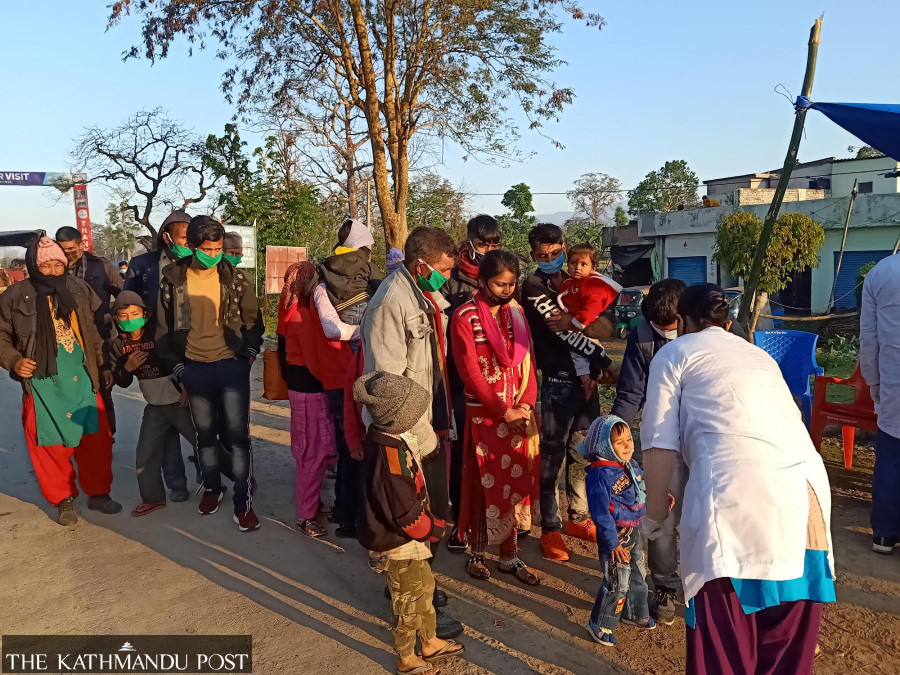Health
Border surveillance system to be activated to screen incoming travellers for Covid-19
Health experts say risks of several other diseases like malaria, dengue and kala-azar also increase with thousands of people returning home for the festival holidays.
Arjun Poudel
The Epidemiology and Disease Control Division has directed all agencies concerned to increase antigen tests at border points and carry out the test in the maximum number of people possible.
The directive comes just as Nepalis based in foreign countries have started to return home to celebrate the Dashain festival with their families.
“Antigen test is among several measures health authorities can take to lessen the spread of the coronavirus infection,” said Dr Samir Kumar Adhikari, joint spokesperson for the Ministry of Health and Population. “With thousands of migrants expected to return home for the festival, the risk of infections increases.”
It is estimated that up to 100,000 people enter the country daily ahead of the Dashain festival through major checkpoints set up at various land crossings with India. There is no record on the number of people entering the country through small border crossings where there are no checkpoints.
The influx of people into the country during the festival means an increased risk of outbreaks of various diseases, not just Covid-19. In the past, outbreaks of diseases including malaria, kala-azar, and dengue have been reported immediately after Dashain in many districts.
Health experts say as the risk of Covid-19 infection has not lessened, the surveillance system at border crossings should be made active.
“Besides those agencies under the Health Ministry, we are also working with provincial and local governments, development partners, NGOs and others to put in place necessary measures to make the surveillance system more effective,” said Adhikari.
Experts say that the surveillance system at border crossings should remain active throughout the year and it should be made robust in the time of a pandemic.
“Surveillance is not something we should conduct only after a disease outbreak; it should continue all the time,” said Dr Baburam Marasini, former director at the Epidemiology and Disease Control Division. “Countries having good surveillance systems can contain the outbreak in time and lessen the loss of lives.”
The number of new Covid-19 infections has lessened in recent days, but doctors say that the virus is still circulating in communities and that the risk has not lessened.
On Sunday, 730 people tested positive in 8,589 polymerase chain reaction tests; 104 others tested positive in 5,147 antigen tests. Nine people died of the coronavirus in the last 24 hours. Active cases as of Sunday stand at 19,142.
Doctors say a surge in Covid-19 cases after the Dashain festival cannot be ruled out.
“What we should not forget is nothing is predictable when it comes to the coronavirus,” Dr Tulsi Ram Bhandari, an assistant professor at Pokhara University, told the Post. “As the virus keeps mutating, new surges could be caused by new variants. There is also the chance of the virus variants seen in other parts of the world entering the country.”
With the decline in Covid-19 cases, authorities have opened all land crossings and international flights. Lifting of the travel restrictions has increased the mobility of people as well as various pathogens.
Several diseases including dengue, malaria, seasonal influenza and Nipah virus infection have been reported in India in recent days. Doctors say the possibility of these diseases entering Nepal is high, given the lack of screening of travellers at the border crossings.
Public health experts say a lack of mandatory health screening at border points shows the government’s carelessness about public health.
They said that the authorities’ reactive approach—scrambling for quick fixes after problems start—could spell another disaster for the country.




 11.43°C Kathmandu
11.43°C Kathmandu















